Hilton Food Group PLC: Business Environment and PESTEL Analysis Report
VerifiedAdded on 2023/01/05
|11
|2876
|28
Report
AI Summary
This report provides a comprehensive analysis of Hilton Food Group PLC, a prominent food packaging business. It begins with an introduction to the business environment, emphasizing internal and external factors impacting organizational functions. The report details Hilton Food Group's organizational structure, including the roles and responsibilities of key executives and board members. The core of the report focuses on a PESTEL analysis, a framework used to assess the macro-environmental factors influencing the company. This includes examining the political, economic, social, technological, environmental, and legal factors affecting Hilton Food Group. The analysis highlights the importance of PESTEL in strategic planning and decision-making, providing insights into how these external factors impact the company's operations and future prospects. The report concludes by summarizing the key findings and the overall impact of the business environment on Hilton Food Group PLC.
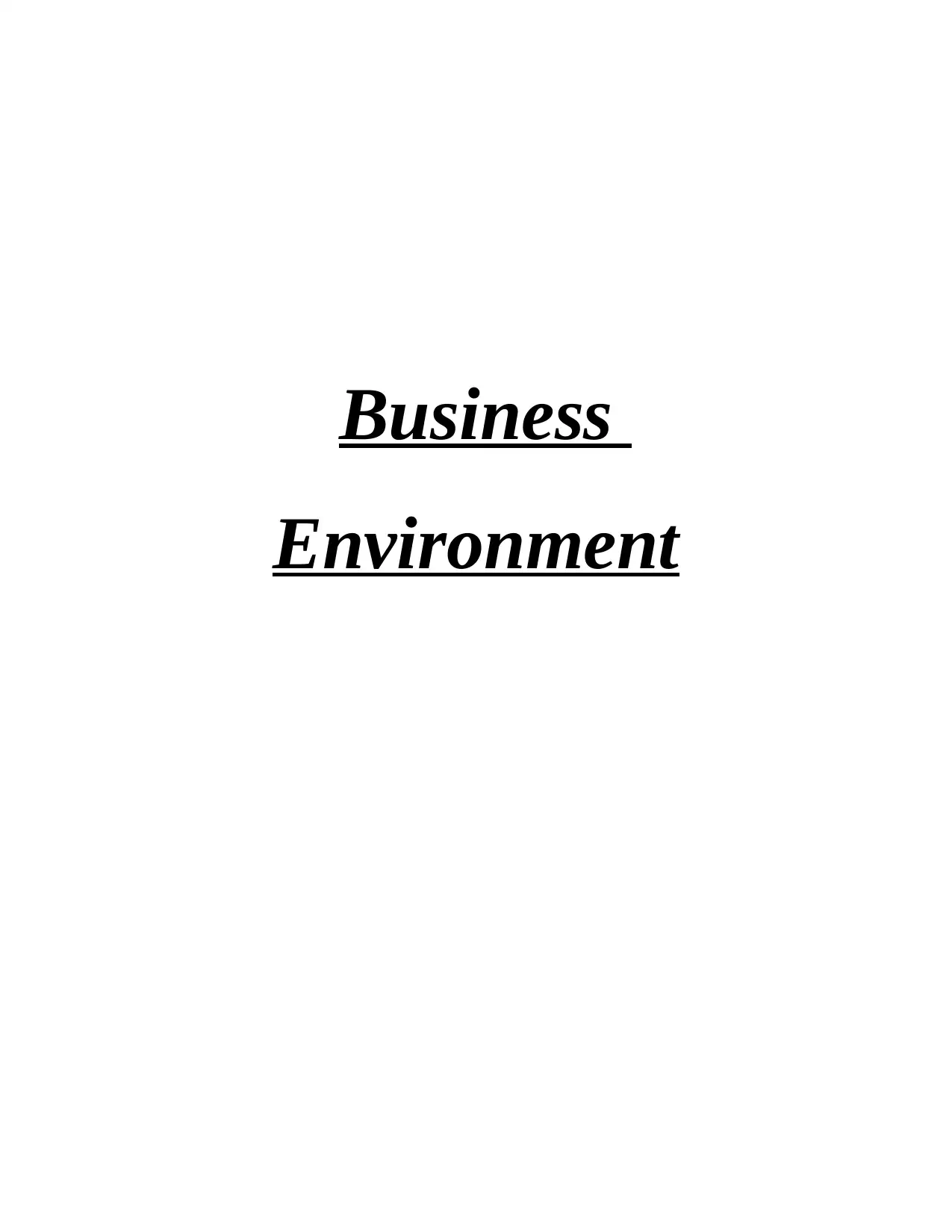
Business
Environment
Environment
Paraphrase This Document
Need a fresh take? Get an instant paraphrase of this document with our AI Paraphraser
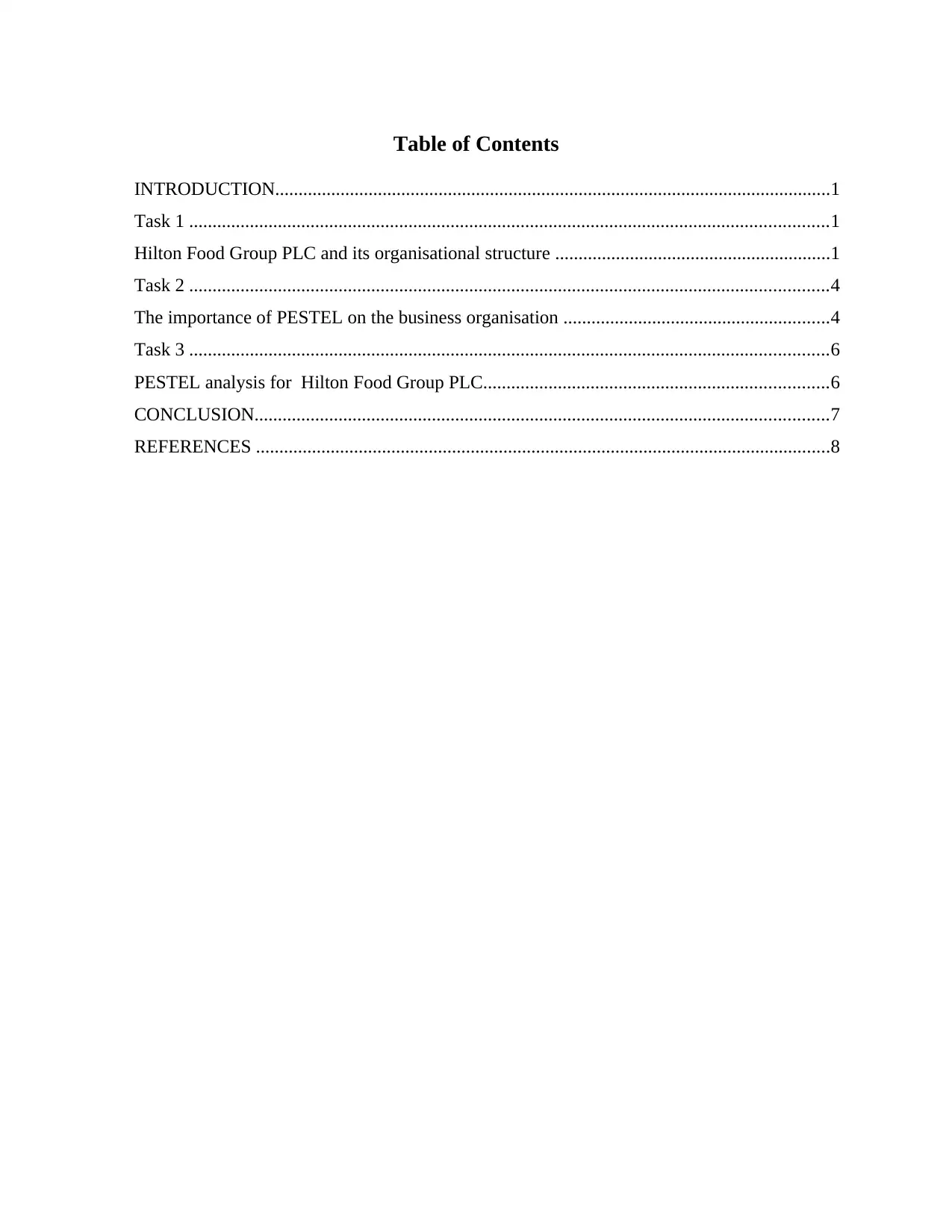
Table of Contents
INTRODUCTION.......................................................................................................................1
Task 1 .........................................................................................................................................1
Hilton Food Group PLC and its organisational structure ...........................................................1
Task 2 .........................................................................................................................................4
The importance of PESTEL on the business organisation .........................................................4
Task 3 .........................................................................................................................................6
PESTEL analysis for Hilton Food Group PLC..........................................................................6
CONCLUSION...........................................................................................................................7
REFERENCES ...........................................................................................................................8
INTRODUCTION.......................................................................................................................1
Task 1 .........................................................................................................................................1
Hilton Food Group PLC and its organisational structure ...........................................................1
Task 2 .........................................................................................................................................4
The importance of PESTEL on the business organisation .........................................................4
Task 3 .........................................................................................................................................6
PESTEL analysis for Hilton Food Group PLC..........................................................................6
CONCLUSION...........................................................................................................................7
REFERENCES ...........................................................................................................................8
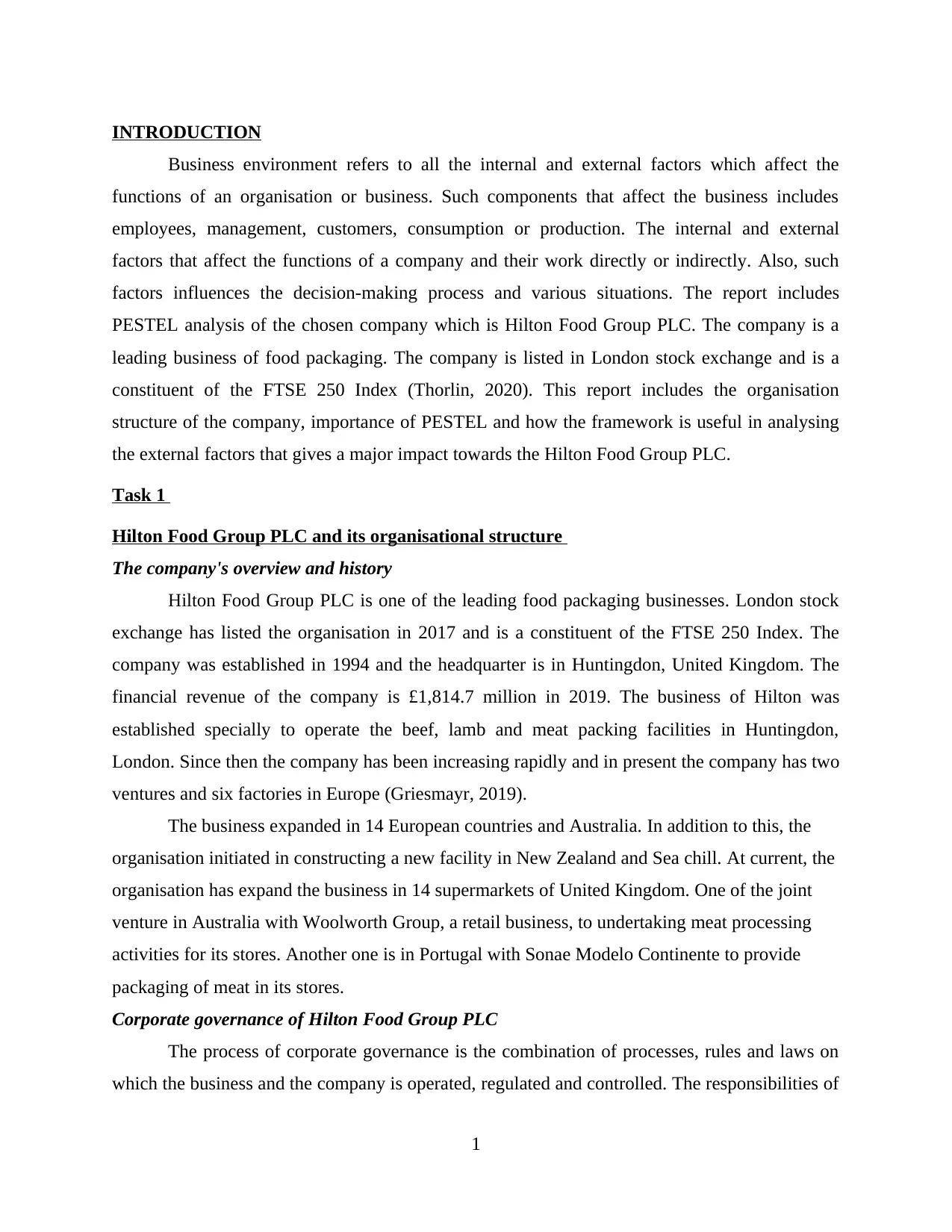
INTRODUCTION
Business environment refers to all the internal and external factors which affect the
functions of an organisation or business. Such components that affect the business includes
employees, management, customers, consumption or production. The internal and external
factors that affect the functions of a company and their work directly or indirectly. Also, such
factors influences the decision-making process and various situations. The report includes
PESTEL analysis of the chosen company which is Hilton Food Group PLC. The company is a
leading business of food packaging. The company is listed in London stock exchange and is a
constituent of the FTSE 250 Index (Thorlin, 2020). This report includes the organisation
structure of the company, importance of PESTEL and how the framework is useful in analysing
the external factors that gives a major impact towards the Hilton Food Group PLC.
Task 1
Hilton Food Group PLC and its organisational structure
The company's overview and history
Hilton Food Group PLC is one of the leading food packaging businesses. London stock
exchange has listed the organisation in 2017 and is a constituent of the FTSE 250 Index. The
company was established in 1994 and the headquarter is in Huntingdon, United Kingdom. The
financial revenue of the company is £1,814.7 million in 2019. The business of Hilton was
established specially to operate the beef, lamb and meat packing facilities in Huntingdon,
London. Since then the company has been increasing rapidly and in present the company has two
ventures and six factories in Europe (Griesmayr, 2019).
The business expanded in 14 European countries and Australia. In addition to this, the
organisation initiated in constructing a new facility in New Zealand and Sea chill. At current, the
organisation has expand the business in 14 supermarkets of United Kingdom. One of the joint
venture in Australia with Woolworth Group, a retail business, to undertaking meat processing
activities for its stores. Another one is in Portugal with Sonae Modelo Continente to provide
packaging of meat in its stores.
Corporate governance of Hilton Food Group PLC
The process of corporate governance is the combination of processes, rules and laws on
which the business and the company is operated, regulated and controlled. The responsibilities of
1
Business environment refers to all the internal and external factors which affect the
functions of an organisation or business. Such components that affect the business includes
employees, management, customers, consumption or production. The internal and external
factors that affect the functions of a company and their work directly or indirectly. Also, such
factors influences the decision-making process and various situations. The report includes
PESTEL analysis of the chosen company which is Hilton Food Group PLC. The company is a
leading business of food packaging. The company is listed in London stock exchange and is a
constituent of the FTSE 250 Index (Thorlin, 2020). This report includes the organisation
structure of the company, importance of PESTEL and how the framework is useful in analysing
the external factors that gives a major impact towards the Hilton Food Group PLC.
Task 1
Hilton Food Group PLC and its organisational structure
The company's overview and history
Hilton Food Group PLC is one of the leading food packaging businesses. London stock
exchange has listed the organisation in 2017 and is a constituent of the FTSE 250 Index. The
company was established in 1994 and the headquarter is in Huntingdon, United Kingdom. The
financial revenue of the company is £1,814.7 million in 2019. The business of Hilton was
established specially to operate the beef, lamb and meat packing facilities in Huntingdon,
London. Since then the company has been increasing rapidly and in present the company has two
ventures and six factories in Europe (Griesmayr, 2019).
The business expanded in 14 European countries and Australia. In addition to this, the
organisation initiated in constructing a new facility in New Zealand and Sea chill. At current, the
organisation has expand the business in 14 supermarkets of United Kingdom. One of the joint
venture in Australia with Woolworth Group, a retail business, to undertaking meat processing
activities for its stores. Another one is in Portugal with Sonae Modelo Continente to provide
packaging of meat in its stores.
Corporate governance of Hilton Food Group PLC
The process of corporate governance is the combination of processes, rules and laws on
which the business and the company is operated, regulated and controlled. The responsibilities of
1
⊘ This is a preview!⊘
Do you want full access?
Subscribe today to unlock all pages.

Trusted by 1+ million students worldwide
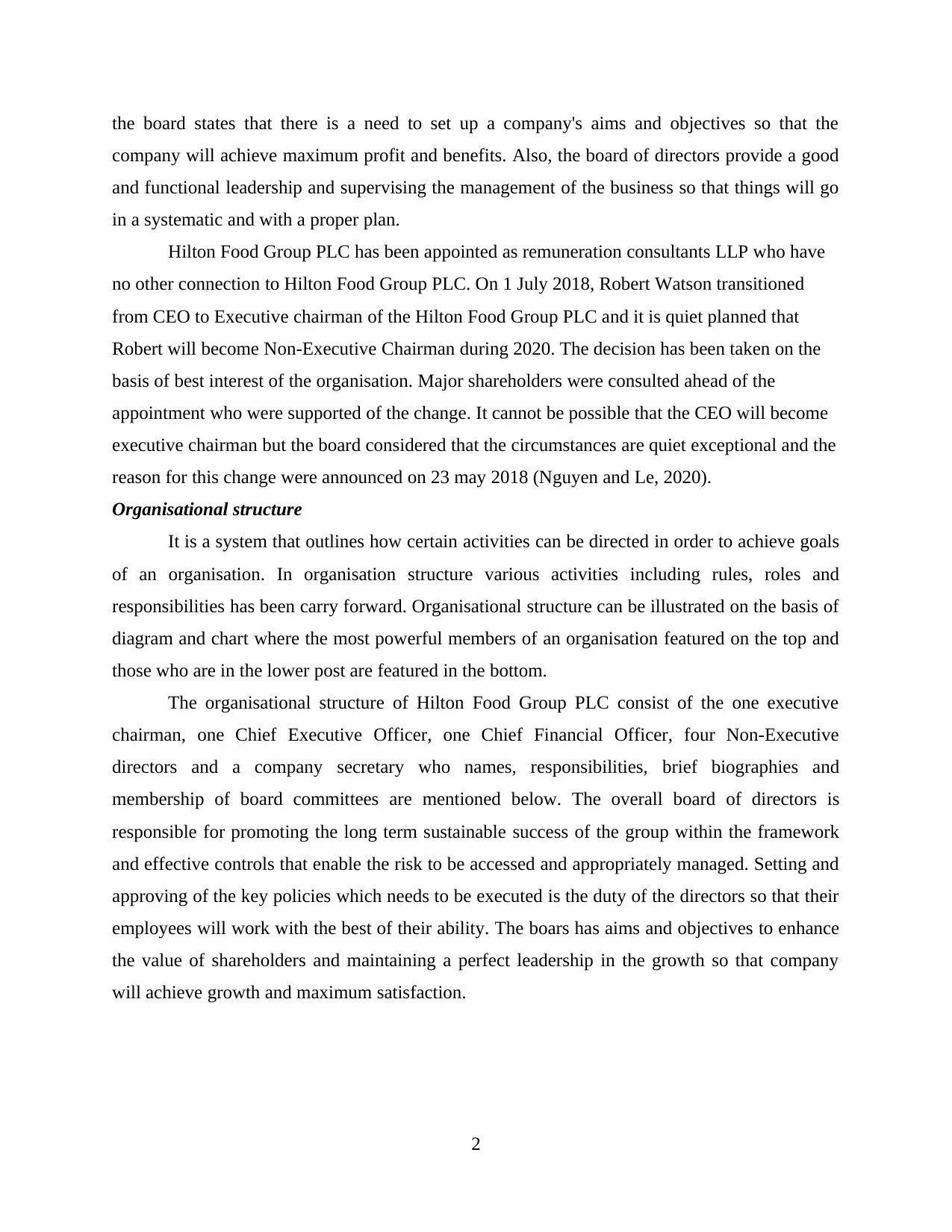
the board states that there is a need to set up a company's aims and objectives so that the
company will achieve maximum profit and benefits. Also, the board of directors provide a good
and functional leadership and supervising the management of the business so that things will go
in a systematic and with a proper plan.
Hilton Food Group PLC has been appointed as remuneration consultants LLP who have
no other connection to Hilton Food Group PLC. On 1 July 2018, Robert Watson transitioned
from CEO to Executive chairman of the Hilton Food Group PLC and it is quiet planned that
Robert will become Non-Executive Chairman during 2020. The decision has been taken on the
basis of best interest of the organisation. Major shareholders were consulted ahead of the
appointment who were supported of the change. It cannot be possible that the CEO will become
executive chairman but the board considered that the circumstances are quiet exceptional and the
reason for this change were announced on 23 may 2018 (Nguyen and Le, 2020).
Organisational structure
It is a system that outlines how certain activities can be directed in order to achieve goals
of an organisation. In organisation structure various activities including rules, roles and
responsibilities has been carry forward. Organisational structure can be illustrated on the basis of
diagram and chart where the most powerful members of an organisation featured on the top and
those who are in the lower post are featured in the bottom.
The organisational structure of Hilton Food Group PLC consist of the one executive
chairman, one Chief Executive Officer, one Chief Financial Officer, four Non-Executive
directors and a company secretary who names, responsibilities, brief biographies and
membership of board committees are mentioned below. The overall board of directors is
responsible for promoting the long term sustainable success of the group within the framework
and effective controls that enable the risk to be accessed and appropriately managed. Setting and
approving of the key policies which needs to be executed is the duty of the directors so that their
employees will work with the best of their ability. The boars has aims and objectives to enhance
the value of shareholders and maintaining a perfect leadership in the growth so that company
will achieve growth and maximum satisfaction.
2
company will achieve maximum profit and benefits. Also, the board of directors provide a good
and functional leadership and supervising the management of the business so that things will go
in a systematic and with a proper plan.
Hilton Food Group PLC has been appointed as remuneration consultants LLP who have
no other connection to Hilton Food Group PLC. On 1 July 2018, Robert Watson transitioned
from CEO to Executive chairman of the Hilton Food Group PLC and it is quiet planned that
Robert will become Non-Executive Chairman during 2020. The decision has been taken on the
basis of best interest of the organisation. Major shareholders were consulted ahead of the
appointment who were supported of the change. It cannot be possible that the CEO will become
executive chairman but the board considered that the circumstances are quiet exceptional and the
reason for this change were announced on 23 may 2018 (Nguyen and Le, 2020).
Organisational structure
It is a system that outlines how certain activities can be directed in order to achieve goals
of an organisation. In organisation structure various activities including rules, roles and
responsibilities has been carry forward. Organisational structure can be illustrated on the basis of
diagram and chart where the most powerful members of an organisation featured on the top and
those who are in the lower post are featured in the bottom.
The organisational structure of Hilton Food Group PLC consist of the one executive
chairman, one Chief Executive Officer, one Chief Financial Officer, four Non-Executive
directors and a company secretary who names, responsibilities, brief biographies and
membership of board committees are mentioned below. The overall board of directors is
responsible for promoting the long term sustainable success of the group within the framework
and effective controls that enable the risk to be accessed and appropriately managed. Setting and
approving of the key policies which needs to be executed is the duty of the directors so that their
employees will work with the best of their ability. The boars has aims and objectives to enhance
the value of shareholders and maintaining a perfect leadership in the growth so that company
will achieve growth and maximum satisfaction.
2
Paraphrase This Document
Need a fresh take? Get an instant paraphrase of this document with our AI Paraphraser
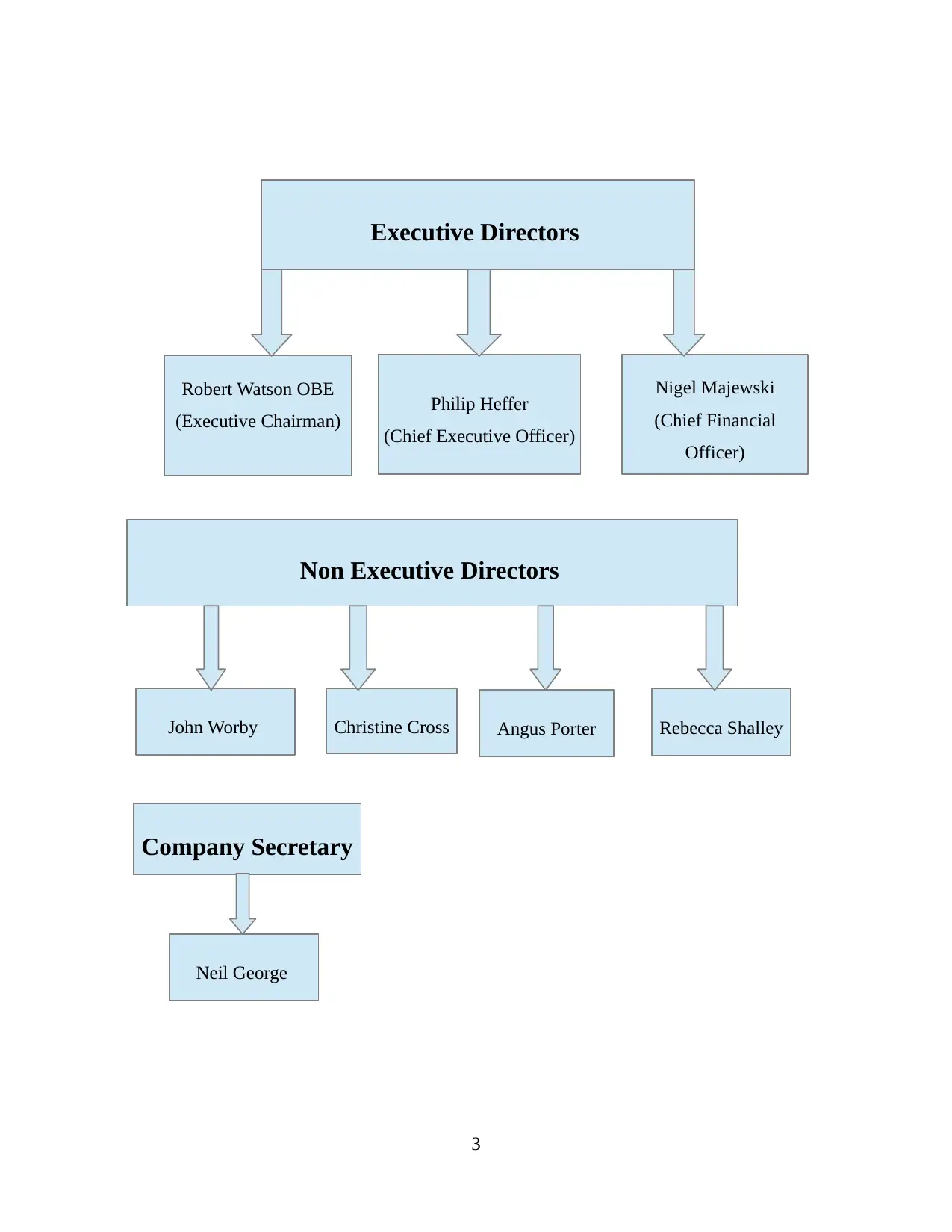
3
Executive Directors
Robert Watson OBE
(Executive Chairman) Philip Heffer
(Chief Executive Officer)
Nigel Majewski
(Chief Financial
Officer)
Non Executive Directors
John Worby Christine Cross Angus Porter Rebecca Shalley
Company Secretary
Neil George
Executive Directors
Robert Watson OBE
(Executive Chairman) Philip Heffer
(Chief Executive Officer)
Nigel Majewski
(Chief Financial
Officer)
Non Executive Directors
John Worby Christine Cross Angus Porter Rebecca Shalley
Company Secretary
Neil George
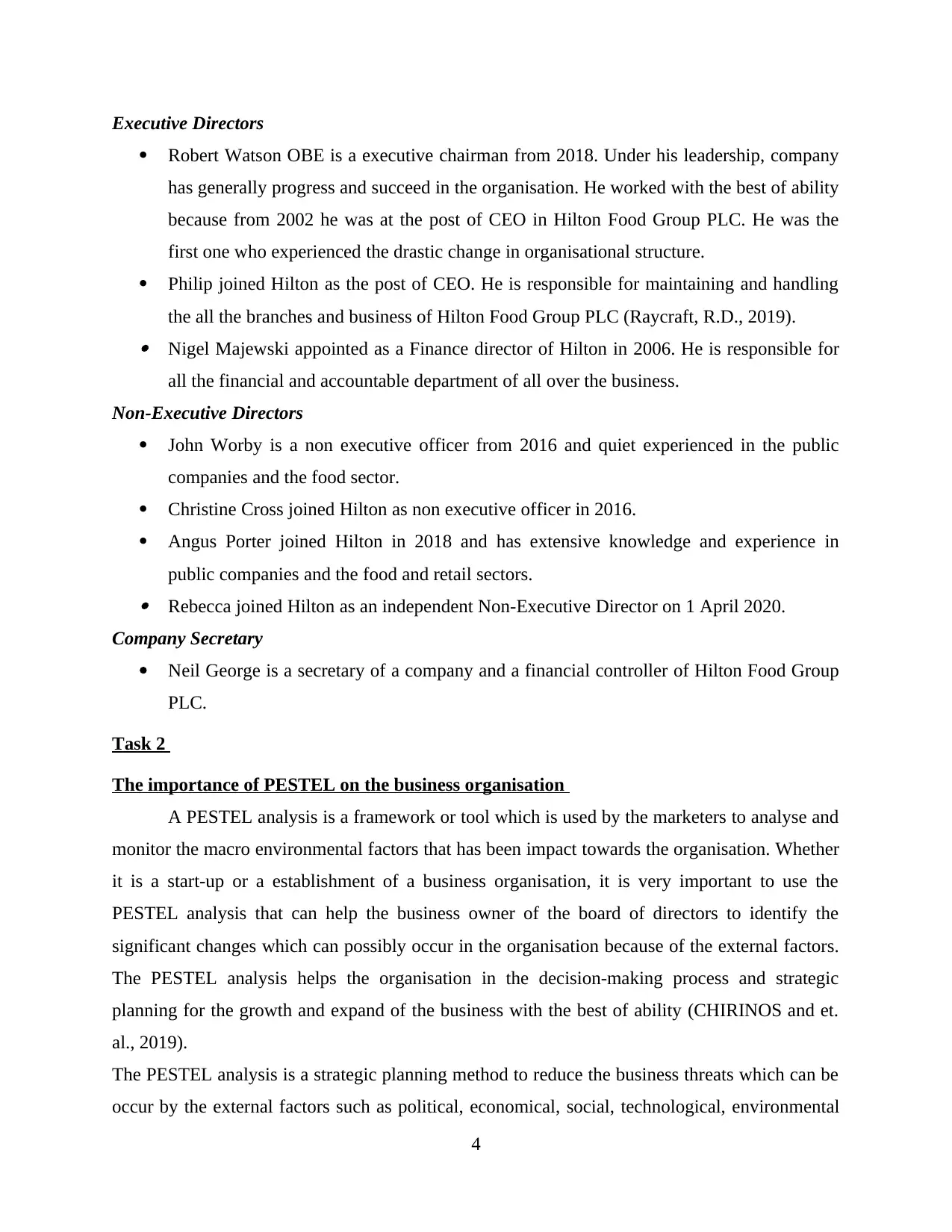
Executive Directors
Robert Watson OBE is a executive chairman from 2018. Under his leadership, company
has generally progress and succeed in the organisation. He worked with the best of ability
because from 2002 he was at the post of CEO in Hilton Food Group PLC. He was the
first one who experienced the drastic change in organisational structure.
Philip joined Hilton as the post of CEO. He is responsible for maintaining and handling
the all the branches and business of Hilton Food Group PLC (Raycraft, R.D., 2019). Nigel Majewski appointed as a Finance director of Hilton in 2006. He is responsible for
all the financial and accountable department of all over the business.
Non-Executive Directors
John Worby is a non executive officer from 2016 and quiet experienced in the public
companies and the food sector.
Christine Cross joined Hilton as non executive officer in 2016.
Angus Porter joined Hilton in 2018 and has extensive knowledge and experience in
public companies and the food and retail sectors. Rebecca joined Hilton as an independent Non-Executive Director on 1 April 2020.
Company Secretary
Neil George is a secretary of a company and a financial controller of Hilton Food Group
PLC.
Task 2
The importance of PESTEL on the business organisation
A PESTEL analysis is a framework or tool which is used by the marketers to analyse and
monitor the macro environmental factors that has been impact towards the organisation. Whether
it is a start-up or a establishment of a business organisation, it is very important to use the
PESTEL analysis that can help the business owner of the board of directors to identify the
significant changes which can possibly occur in the organisation because of the external factors.
The PESTEL analysis helps the organisation in the decision-making process and strategic
planning for the growth and expand of the business with the best of ability (CHIRINOS and et.
al., 2019).
The PESTEL analysis is a strategic planning method to reduce the business threats which can be
occur by the external factors such as political, economical, social, technological, environmental
4
Robert Watson OBE is a executive chairman from 2018. Under his leadership, company
has generally progress and succeed in the organisation. He worked with the best of ability
because from 2002 he was at the post of CEO in Hilton Food Group PLC. He was the
first one who experienced the drastic change in organisational structure.
Philip joined Hilton as the post of CEO. He is responsible for maintaining and handling
the all the branches and business of Hilton Food Group PLC (Raycraft, R.D., 2019). Nigel Majewski appointed as a Finance director of Hilton in 2006. He is responsible for
all the financial and accountable department of all over the business.
Non-Executive Directors
John Worby is a non executive officer from 2016 and quiet experienced in the public
companies and the food sector.
Christine Cross joined Hilton as non executive officer in 2016.
Angus Porter joined Hilton in 2018 and has extensive knowledge and experience in
public companies and the food and retail sectors. Rebecca joined Hilton as an independent Non-Executive Director on 1 April 2020.
Company Secretary
Neil George is a secretary of a company and a financial controller of Hilton Food Group
PLC.
Task 2
The importance of PESTEL on the business organisation
A PESTEL analysis is a framework or tool which is used by the marketers to analyse and
monitor the macro environmental factors that has been impact towards the organisation. Whether
it is a start-up or a establishment of a business organisation, it is very important to use the
PESTEL analysis that can help the business owner of the board of directors to identify the
significant changes which can possibly occur in the organisation because of the external factors.
The PESTEL analysis helps the organisation in the decision-making process and strategic
planning for the growth and expand of the business with the best of ability (CHIRINOS and et.
al., 2019).
The PESTEL analysis is a strategic planning method to reduce the business threats which can be
occur by the external factors such as political, economical, social, technological, environmental
4
⊘ This is a preview!⊘
Do you want full access?
Subscribe today to unlock all pages.

Trusted by 1+ million students worldwide
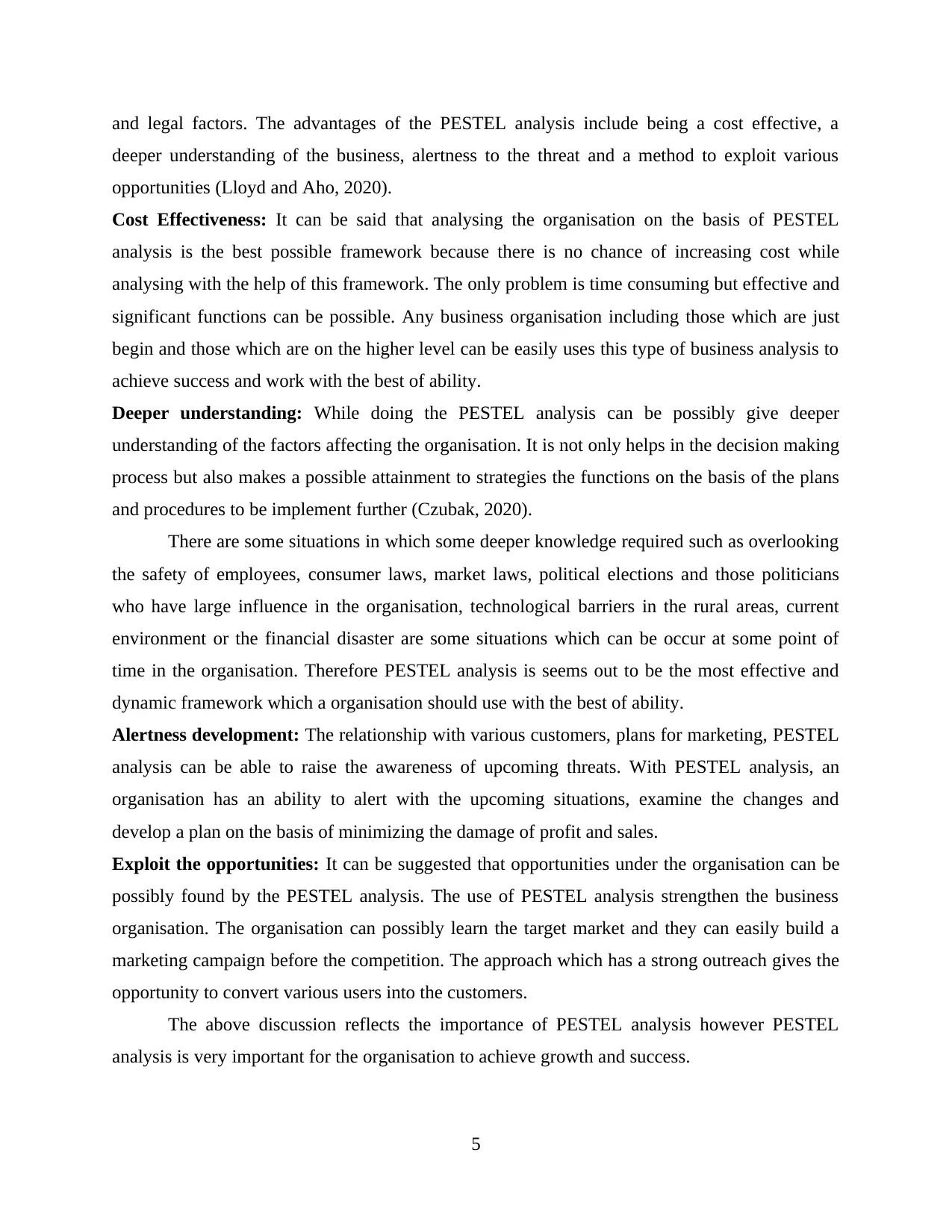
and legal factors. The advantages of the PESTEL analysis include being a cost effective, a
deeper understanding of the business, alertness to the threat and a method to exploit various
opportunities (Lloyd and Aho, 2020).
Cost Effectiveness: It can be said that analysing the organisation on the basis of PESTEL
analysis is the best possible framework because there is no chance of increasing cost while
analysing with the help of this framework. The only problem is time consuming but effective and
significant functions can be possible. Any business organisation including those which are just
begin and those which are on the higher level can be easily uses this type of business analysis to
achieve success and work with the best of ability.
Deeper understanding: While doing the PESTEL analysis can be possibly give deeper
understanding of the factors affecting the organisation. It is not only helps in the decision making
process but also makes a possible attainment to strategies the functions on the basis of the plans
and procedures to be implement further (Czubak, 2020).
There are some situations in which some deeper knowledge required such as overlooking
the safety of employees, consumer laws, market laws, political elections and those politicians
who have large influence in the organisation, technological barriers in the rural areas, current
environment or the financial disaster are some situations which can be occur at some point of
time in the organisation. Therefore PESTEL analysis is seems out to be the most effective and
dynamic framework which a organisation should use with the best of ability.
Alertness development: The relationship with various customers, plans for marketing, PESTEL
analysis can be able to raise the awareness of upcoming threats. With PESTEL analysis, an
organisation has an ability to alert with the upcoming situations, examine the changes and
develop a plan on the basis of minimizing the damage of profit and sales.
Exploit the opportunities: It can be suggested that opportunities under the organisation can be
possibly found by the PESTEL analysis. The use of PESTEL analysis strengthen the business
organisation. The organisation can possibly learn the target market and they can easily build a
marketing campaign before the competition. The approach which has a strong outreach gives the
opportunity to convert various users into the customers.
The above discussion reflects the importance of PESTEL analysis however PESTEL
analysis is very important for the organisation to achieve growth and success.
5
deeper understanding of the business, alertness to the threat and a method to exploit various
opportunities (Lloyd and Aho, 2020).
Cost Effectiveness: It can be said that analysing the organisation on the basis of PESTEL
analysis is the best possible framework because there is no chance of increasing cost while
analysing with the help of this framework. The only problem is time consuming but effective and
significant functions can be possible. Any business organisation including those which are just
begin and those which are on the higher level can be easily uses this type of business analysis to
achieve success and work with the best of ability.
Deeper understanding: While doing the PESTEL analysis can be possibly give deeper
understanding of the factors affecting the organisation. It is not only helps in the decision making
process but also makes a possible attainment to strategies the functions on the basis of the plans
and procedures to be implement further (Czubak, 2020).
There are some situations in which some deeper knowledge required such as overlooking
the safety of employees, consumer laws, market laws, political elections and those politicians
who have large influence in the organisation, technological barriers in the rural areas, current
environment or the financial disaster are some situations which can be occur at some point of
time in the organisation. Therefore PESTEL analysis is seems out to be the most effective and
dynamic framework which a organisation should use with the best of ability.
Alertness development: The relationship with various customers, plans for marketing, PESTEL
analysis can be able to raise the awareness of upcoming threats. With PESTEL analysis, an
organisation has an ability to alert with the upcoming situations, examine the changes and
develop a plan on the basis of minimizing the damage of profit and sales.
Exploit the opportunities: It can be suggested that opportunities under the organisation can be
possibly found by the PESTEL analysis. The use of PESTEL analysis strengthen the business
organisation. The organisation can possibly learn the target market and they can easily build a
marketing campaign before the competition. The approach which has a strong outreach gives the
opportunity to convert various users into the customers.
The above discussion reflects the importance of PESTEL analysis however PESTEL
analysis is very important for the organisation to achieve growth and success.
5
Paraphrase This Document
Need a fresh take? Get an instant paraphrase of this document with our AI Paraphraser
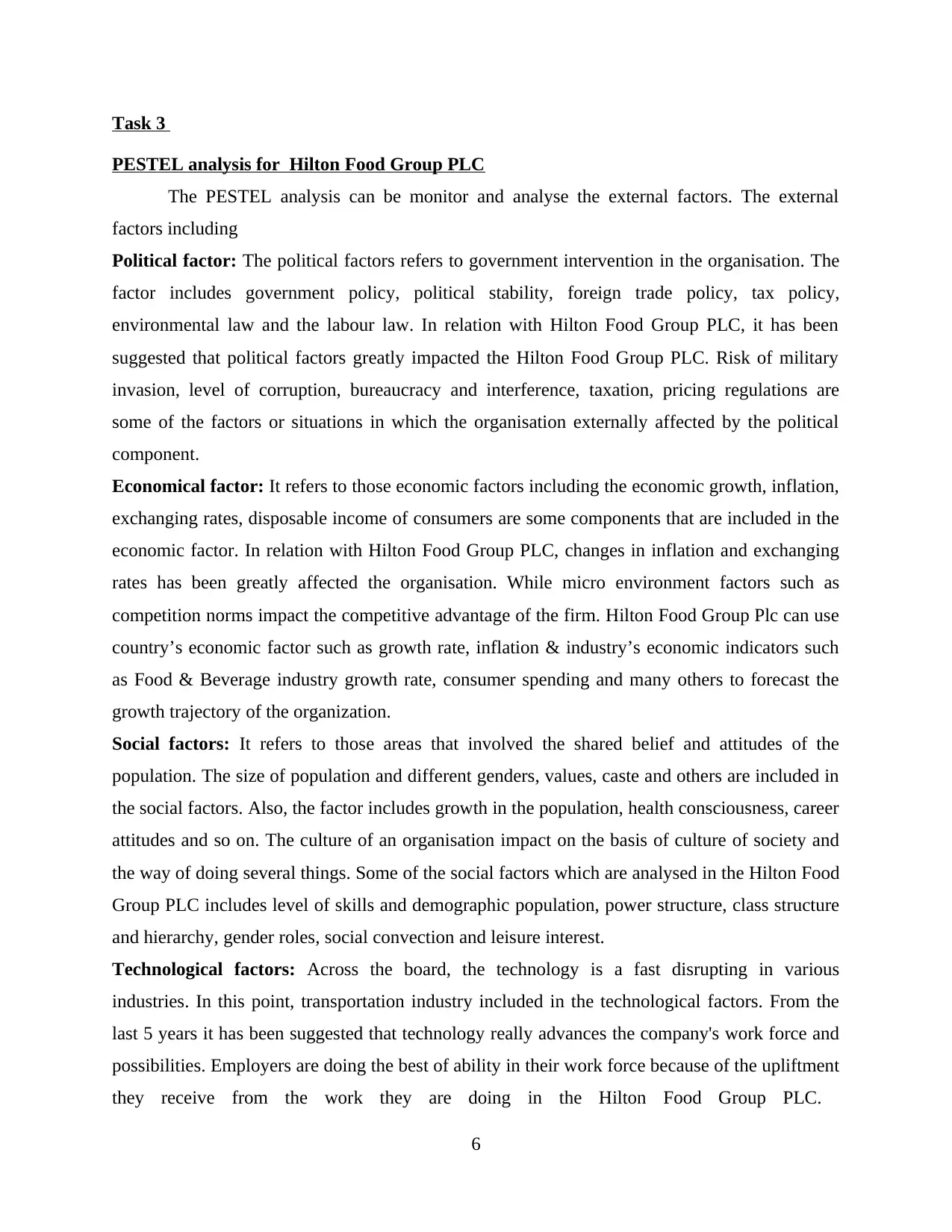
Task 3
PESTEL analysis for Hilton Food Group PLC
The PESTEL analysis can be monitor and analyse the external factors. The external
factors including
Political factor: The political factors refers to government intervention in the organisation. The
factor includes government policy, political stability, foreign trade policy, tax policy,
environmental law and the labour law. In relation with Hilton Food Group PLC, it has been
suggested that political factors greatly impacted the Hilton Food Group PLC. Risk of military
invasion, level of corruption, bureaucracy and interference, taxation, pricing regulations are
some of the factors or situations in which the organisation externally affected by the political
component.
Economical factor: It refers to those economic factors including the economic growth, inflation,
exchanging rates, disposable income of consumers are some components that are included in the
economic factor. In relation with Hilton Food Group PLC, changes in inflation and exchanging
rates has been greatly affected the organisation. While micro environment factors such as
competition norms impact the competitive advantage of the firm. Hilton Food Group Plc can use
country’s economic factor such as growth rate, inflation & industry’s economic indicators such
as Food & Beverage industry growth rate, consumer spending and many others to forecast the
growth trajectory of the organization.
Social factors: It refers to those areas that involved the shared belief and attitudes of the
population. The size of population and different genders, values, caste and others are included in
the social factors. Also, the factor includes growth in the population, health consciousness, career
attitudes and so on. The culture of an organisation impact on the basis of culture of society and
the way of doing several things. Some of the social factors which are analysed in the Hilton Food
Group PLC includes level of skills and demographic population, power structure, class structure
and hierarchy, gender roles, social convection and leisure interest.
Technological factors: Across the board, the technology is a fast disrupting in various
industries. In this point, transportation industry included in the technological factors. From the
last 5 years it has been suggested that technology really advances the company's work force and
possibilities. Employers are doing the best of ability in their work force because of the upliftment
they receive from the work they are doing in the Hilton Food Group PLC.
6
PESTEL analysis for Hilton Food Group PLC
The PESTEL analysis can be monitor and analyse the external factors. The external
factors including
Political factor: The political factors refers to government intervention in the organisation. The
factor includes government policy, political stability, foreign trade policy, tax policy,
environmental law and the labour law. In relation with Hilton Food Group PLC, it has been
suggested that political factors greatly impacted the Hilton Food Group PLC. Risk of military
invasion, level of corruption, bureaucracy and interference, taxation, pricing regulations are
some of the factors or situations in which the organisation externally affected by the political
component.
Economical factor: It refers to those economic factors including the economic growth, inflation,
exchanging rates, disposable income of consumers are some components that are included in the
economic factor. In relation with Hilton Food Group PLC, changes in inflation and exchanging
rates has been greatly affected the organisation. While micro environment factors such as
competition norms impact the competitive advantage of the firm. Hilton Food Group Plc can use
country’s economic factor such as growth rate, inflation & industry’s economic indicators such
as Food & Beverage industry growth rate, consumer spending and many others to forecast the
growth trajectory of the organization.
Social factors: It refers to those areas that involved the shared belief and attitudes of the
population. The size of population and different genders, values, caste and others are included in
the social factors. Also, the factor includes growth in the population, health consciousness, career
attitudes and so on. The culture of an organisation impact on the basis of culture of society and
the way of doing several things. Some of the social factors which are analysed in the Hilton Food
Group PLC includes level of skills and demographic population, power structure, class structure
and hierarchy, gender roles, social convection and leisure interest.
Technological factors: Across the board, the technology is a fast disrupting in various
industries. In this point, transportation industry included in the technological factors. From the
last 5 years it has been suggested that technology really advances the company's work force and
possibilities. Employers are doing the best of ability in their work force because of the upliftment
they receive from the work they are doing in the Hilton Food Group PLC.
6
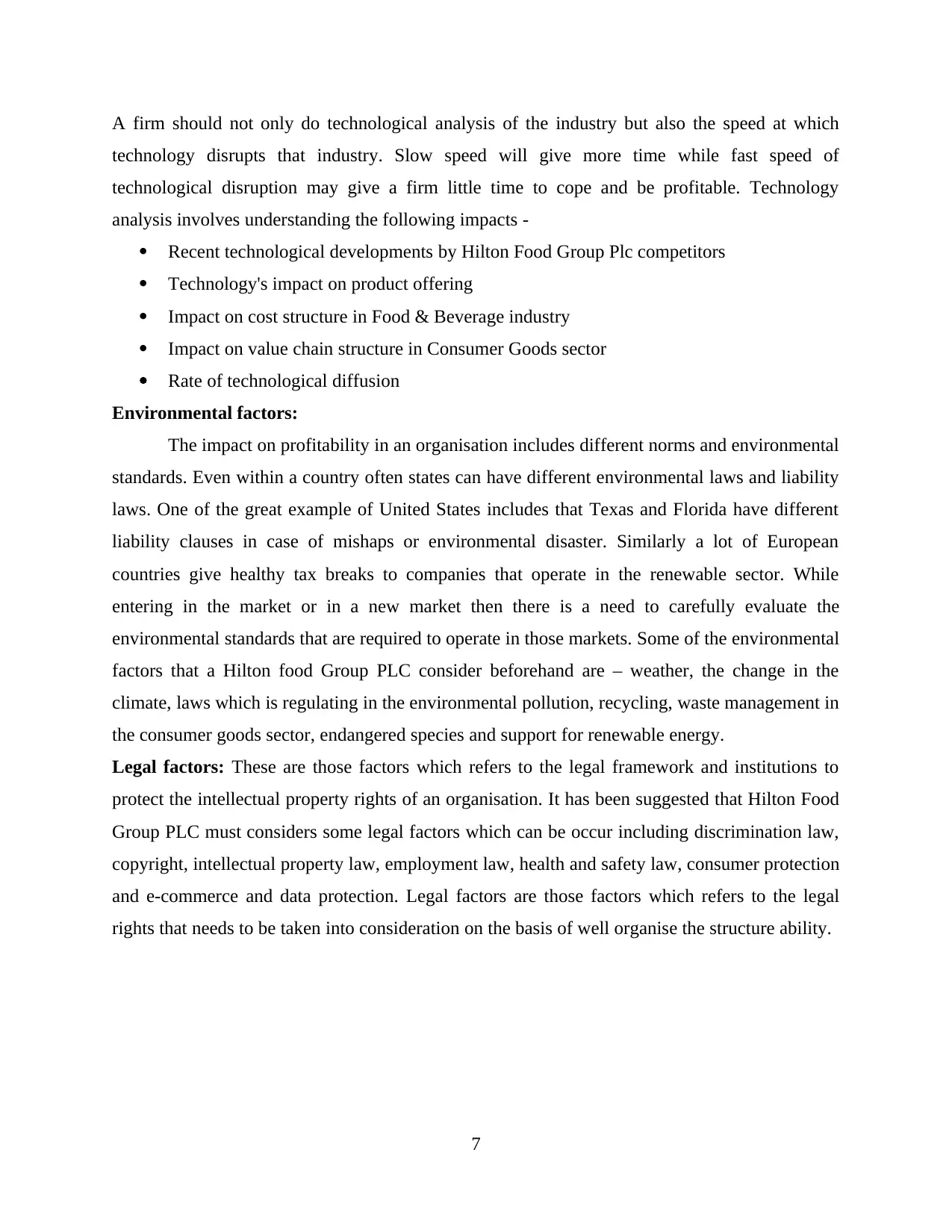
A firm should not only do technological analysis of the industry but also the speed at which
technology disrupts that industry. Slow speed will give more time while fast speed of
technological disruption may give a firm little time to cope and be profitable. Technology
analysis involves understanding the following impacts -
Recent technological developments by Hilton Food Group Plc competitors
Technology's impact on product offering
Impact on cost structure in Food & Beverage industry
Impact on value chain structure in Consumer Goods sector
Rate of technological diffusion
Environmental factors:
The impact on profitability in an organisation includes different norms and environmental
standards. Even within a country often states can have different environmental laws and liability
laws. One of the great example of United States includes that Texas and Florida have different
liability clauses in case of mishaps or environmental disaster. Similarly a lot of European
countries give healthy tax breaks to companies that operate in the renewable sector. While
entering in the market or in a new market then there is a need to carefully evaluate the
environmental standards that are required to operate in those markets. Some of the environmental
factors that a Hilton food Group PLC consider beforehand are – weather, the change in the
climate, laws which is regulating in the environmental pollution, recycling, waste management in
the consumer goods sector, endangered species and support for renewable energy.
Legal factors: These are those factors which refers to the legal framework and institutions to
protect the intellectual property rights of an organisation. It has been suggested that Hilton Food
Group PLC must considers some legal factors which can be occur including discrimination law,
copyright, intellectual property law, employment law, health and safety law, consumer protection
and e-commerce and data protection. Legal factors are those factors which refers to the legal
rights that needs to be taken into consideration on the basis of well organise the structure ability.
7
technology disrupts that industry. Slow speed will give more time while fast speed of
technological disruption may give a firm little time to cope and be profitable. Technology
analysis involves understanding the following impacts -
Recent technological developments by Hilton Food Group Plc competitors
Technology's impact on product offering
Impact on cost structure in Food & Beverage industry
Impact on value chain structure in Consumer Goods sector
Rate of technological diffusion
Environmental factors:
The impact on profitability in an organisation includes different norms and environmental
standards. Even within a country often states can have different environmental laws and liability
laws. One of the great example of United States includes that Texas and Florida have different
liability clauses in case of mishaps or environmental disaster. Similarly a lot of European
countries give healthy tax breaks to companies that operate in the renewable sector. While
entering in the market or in a new market then there is a need to carefully evaluate the
environmental standards that are required to operate in those markets. Some of the environmental
factors that a Hilton food Group PLC consider beforehand are – weather, the change in the
climate, laws which is regulating in the environmental pollution, recycling, waste management in
the consumer goods sector, endangered species and support for renewable energy.
Legal factors: These are those factors which refers to the legal framework and institutions to
protect the intellectual property rights of an organisation. It has been suggested that Hilton Food
Group PLC must considers some legal factors which can be occur including discrimination law,
copyright, intellectual property law, employment law, health and safety law, consumer protection
and e-commerce and data protection. Legal factors are those factors which refers to the legal
rights that needs to be taken into consideration on the basis of well organise the structure ability.
7
⊘ This is a preview!⊘
Do you want full access?
Subscribe today to unlock all pages.

Trusted by 1+ million students worldwide
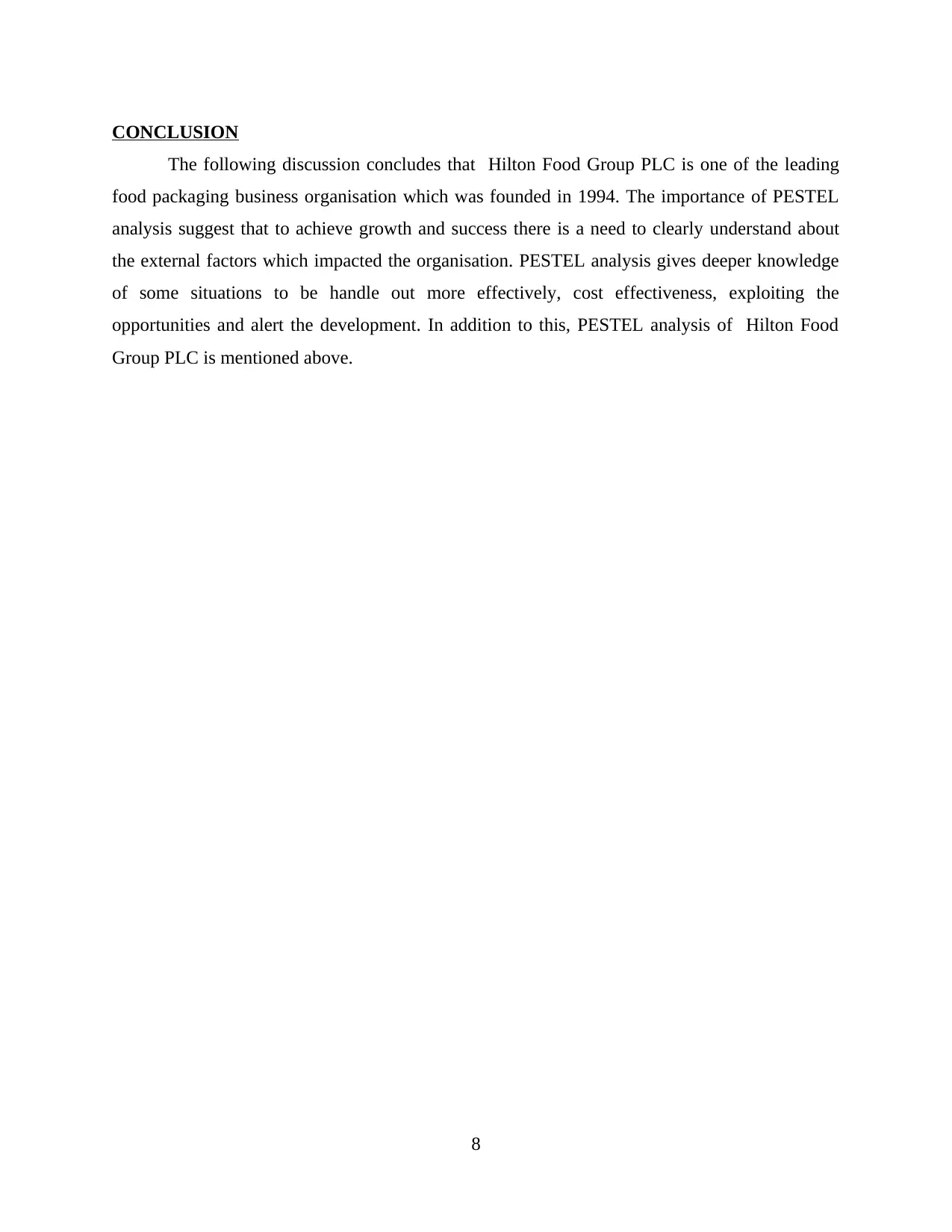
CONCLUSION
The following discussion concludes that Hilton Food Group PLC is one of the leading
food packaging business organisation which was founded in 1994. The importance of PESTEL
analysis suggest that to achieve growth and success there is a need to clearly understand about
the external factors which impacted the organisation. PESTEL analysis gives deeper knowledge
of some situations to be handle out more effectively, cost effectiveness, exploiting the
opportunities and alert the development. In addition to this, PESTEL analysis of Hilton Food
Group PLC is mentioned above.
8
The following discussion concludes that Hilton Food Group PLC is one of the leading
food packaging business organisation which was founded in 1994. The importance of PESTEL
analysis suggest that to achieve growth and success there is a need to clearly understand about
the external factors which impacted the organisation. PESTEL analysis gives deeper knowledge
of some situations to be handle out more effectively, cost effectiveness, exploiting the
opportunities and alert the development. In addition to this, PESTEL analysis of Hilton Food
Group PLC is mentioned above.
8
Paraphrase This Document
Need a fresh take? Get an instant paraphrase of this document with our AI Paraphraser
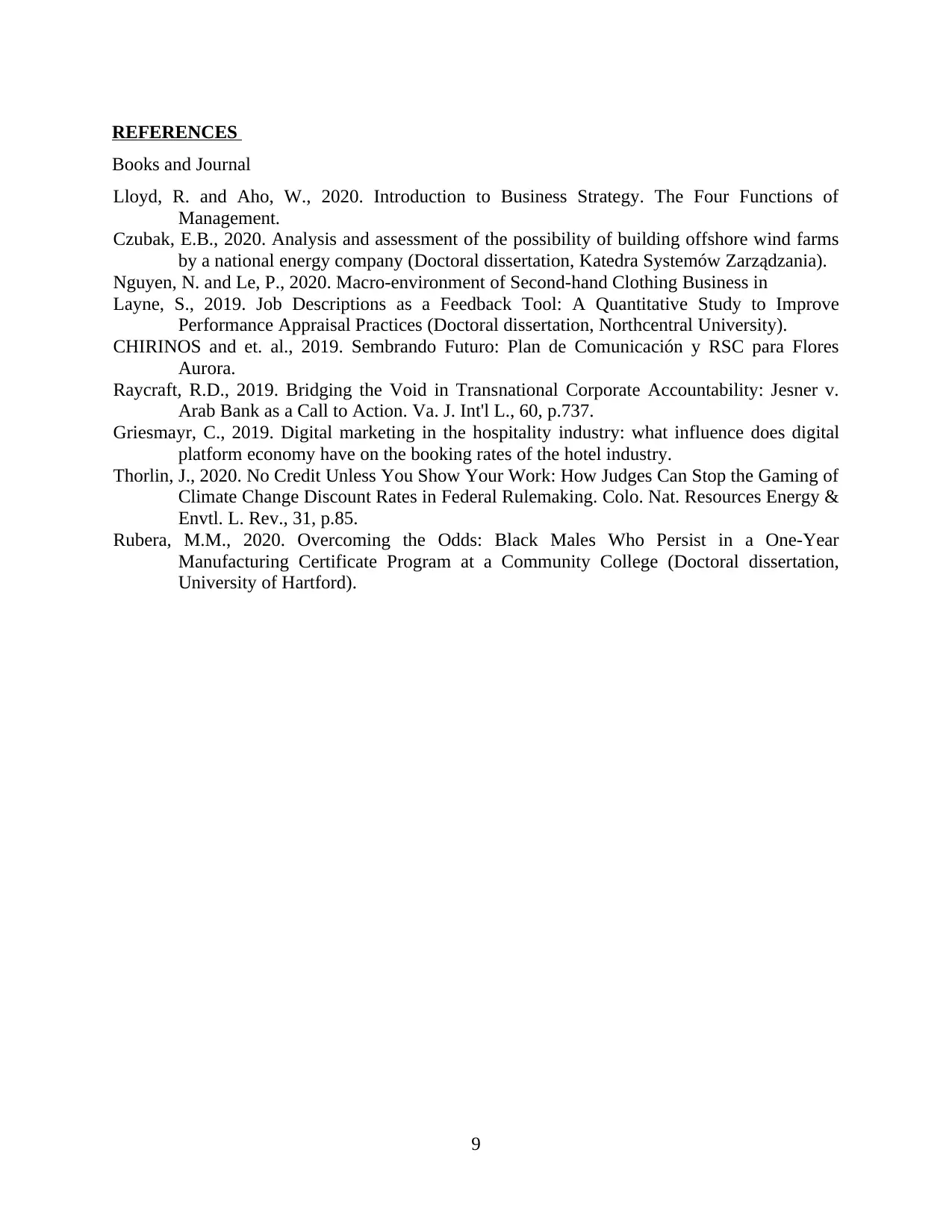
REFERENCES
Books and Journal
Lloyd, R. and Aho, W., 2020. Introduction to Business Strategy. The Four Functions of
Management.
Czubak, E.B., 2020. Analysis and assessment of the possibility of building offshore wind farms
by a national energy company (Doctoral dissertation, Katedra Systemów Zarządzania).
Nguyen, N. and Le, P., 2020. Macro-environment of Second-hand Clothing Business in
Layne, S., 2019. Job Descriptions as a Feedback Tool: A Quantitative Study to Improve
Performance Appraisal Practices (Doctoral dissertation, Northcentral University).
CHIRINOS and et. al., 2019. Sembrando Futuro: Plan de Comunicación y RSC para Flores
Aurora.
Raycraft, R.D., 2019. Bridging the Void in Transnational Corporate Accountability: Jesner v.
Arab Bank as a Call to Action. Va. J. Int'l L., 60, p.737.
Griesmayr, C., 2019. Digital marketing in the hospitality industry: what influence does digital
platform economy have on the booking rates of the hotel industry.
Thorlin, J., 2020. No Credit Unless You Show Your Work: How Judges Can Stop the Gaming of
Climate Change Discount Rates in Federal Rulemaking. Colo. Nat. Resources Energy &
Envtl. L. Rev., 31, p.85.
Rubera, M.M., 2020. Overcoming the Odds: Black Males Who Persist in a One-Year
Manufacturing Certificate Program at a Community College (Doctoral dissertation,
University of Hartford).
9
Books and Journal
Lloyd, R. and Aho, W., 2020. Introduction to Business Strategy. The Four Functions of
Management.
Czubak, E.B., 2020. Analysis and assessment of the possibility of building offshore wind farms
by a national energy company (Doctoral dissertation, Katedra Systemów Zarządzania).
Nguyen, N. and Le, P., 2020. Macro-environment of Second-hand Clothing Business in
Layne, S., 2019. Job Descriptions as a Feedback Tool: A Quantitative Study to Improve
Performance Appraisal Practices (Doctoral dissertation, Northcentral University).
CHIRINOS and et. al., 2019. Sembrando Futuro: Plan de Comunicación y RSC para Flores
Aurora.
Raycraft, R.D., 2019. Bridging the Void in Transnational Corporate Accountability: Jesner v.
Arab Bank as a Call to Action. Va. J. Int'l L., 60, p.737.
Griesmayr, C., 2019. Digital marketing in the hospitality industry: what influence does digital
platform economy have on the booking rates of the hotel industry.
Thorlin, J., 2020. No Credit Unless You Show Your Work: How Judges Can Stop the Gaming of
Climate Change Discount Rates in Federal Rulemaking. Colo. Nat. Resources Energy &
Envtl. L. Rev., 31, p.85.
Rubera, M.M., 2020. Overcoming the Odds: Black Males Who Persist in a One-Year
Manufacturing Certificate Program at a Community College (Doctoral dissertation,
University of Hartford).
9
1 out of 11
Related Documents
Your All-in-One AI-Powered Toolkit for Academic Success.
+13062052269
info@desklib.com
Available 24*7 on WhatsApp / Email
![[object Object]](/_next/static/media/star-bottom.7253800d.svg)
Unlock your academic potential
Copyright © 2020–2026 A2Z Services. All Rights Reserved. Developed and managed by ZUCOL.





